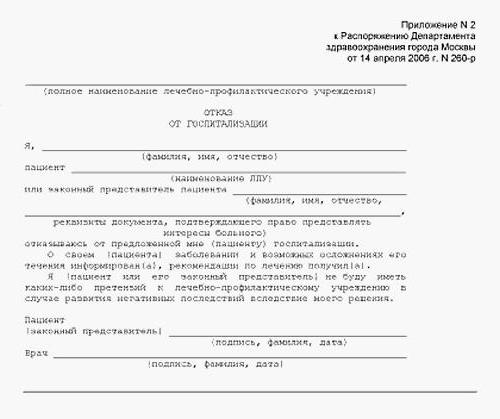In accordance with the provisions of the Federal Law No. 323, the patient has the right to receive information about the state of health, information about the real danger, as well as the measures planned by health workers. Based on the data received, a citizen can independently decide whether he needs treatment in a medical institution. 
If the patient concludes that it is not practical, he can draw uprefusal from hospitalization.
Normative base
Article 11 of the Federal Law No. 323 prohibits clinics, hospitals, and other medical facilities from denying assistance to citizens who have an MHI policy.
A citizen who has received a serious injury or has contracted a dangerous disease has the right to choose the form of treatment (inpatient / outpatient) and the medical facility in which it will be carried out.
Refusal of hospitalization
The application is written in the name of the head physician of the relevant medical institution. AT refusal form indicated:
- Applicant's full name
- The name of the citizen for whom the document is drawn up. For example, refusal of hospitalization of the child are his parents or other legal representatives.
- Information confirming the absence of a requirement on the part of the patient in providing him with medical services.
- The list of attached documents.
In fact, refusal of hospitalization is a document that removes responsibility from health workers for the condition of the patient. 
General rules
According to law refusal of hospitalization can issue any citizen. However, there are several exceptions to this rule. Refusal of hospitalization is not possible with:
- The need for urgent action aimed at stabilizing the condition of a person in emergency situations when it is impossible for a person to independently express his will.
- Conducting forensic examination in the process of investigation of criminal cases.
- The presence of a mental pathology or disease that poses a danger to others.
- The commission by a citizen of a gross violation of the provisions of applicable law.
In these situations, compulsory medical measures of influence or emergency medical assistance are applied to the subject. In all other cases, a citizen can issue refusal of hospitalizationnation. 
What could threaten a refusal to treat a child?
When filling out the application, the legal representatives of the minor take full responsibility for his state of health. In this case, the medical institution has the right to apply to the court at the request of a third party on the fact of illegally depriving the child of the necessary medical care, if this entails a threat to the patient's health / life.
If there are grounds for the parent (legal representative) of the minor, liability measures may be applied, including criminal punishment in case of serious consequences.
Is it possible to issue a refusal in a medical institution?
The patient has the right to apply at any stage of hospitalization. As a rule, a refusal is made out before the person is sent to the hospital. However, in some cases, a patient who enters a medical facility, for some reason, changes his mind and writes a refusal.
It also happens that a citizen is taken unconsciously to a hospital. Having regained consciousness, a person begins to refuse from further stay in a medical institution. It is worth saying that such situations are the most difficult in medical practice. Health workers need to make informed decisions, because a person’s life often depends on them. 
Pregnancy failure
Many expectant mothers pre-choose the institution in which they will give birth. Accordingly, they can write a refusal to be admitted to a budget hospital.
Usually it is issued immediately after registration in the medical center, which monitors the woman. However, the law does not prohibit doing this later.
Refusal of treatment at the TB dispensary
The legislation does not prohibit a person from refusing to be admitted to a tuberculosis clinic.
During treatment, the doctor must obtain consent from the patient for the use of certain medicines and therapeutic methods. If a citizen refuses to receive them, the health worker is obliged to warn him about the possible consequences of such a decision, including the likelihood of deterioration and death.
Hospitalization in an infectious institution
To resolve the issue of refusing to be referred to a medical institution of this type, it is necessary to approach with all seriousness. First of all, the nature of the disease, stage, form should be correctly assessed.
If an infectious pathology poses a high risk to the population, a citizen can be sent to an infectious diseases hospital forcibly. In all other cases, the decision to refuse hospitalization is made by the patient himself.
Conclusion
Currently, the state healthcare system in Russia is not at a high enough level. Many citizens try not to contact state and municipal medical institutions. More and more people are choosing private clinics, specialized medical centers that have all the necessary technical facilities.
However, it should be remembered that in case of refusal from hospitalization, all risks will be borne by the citizen himself.